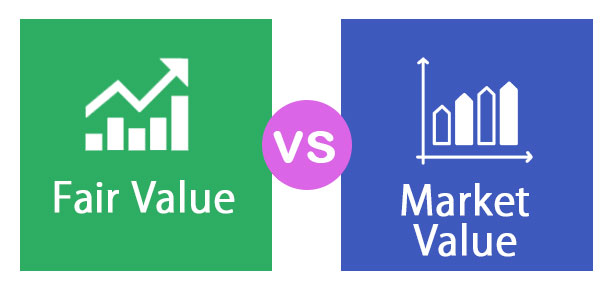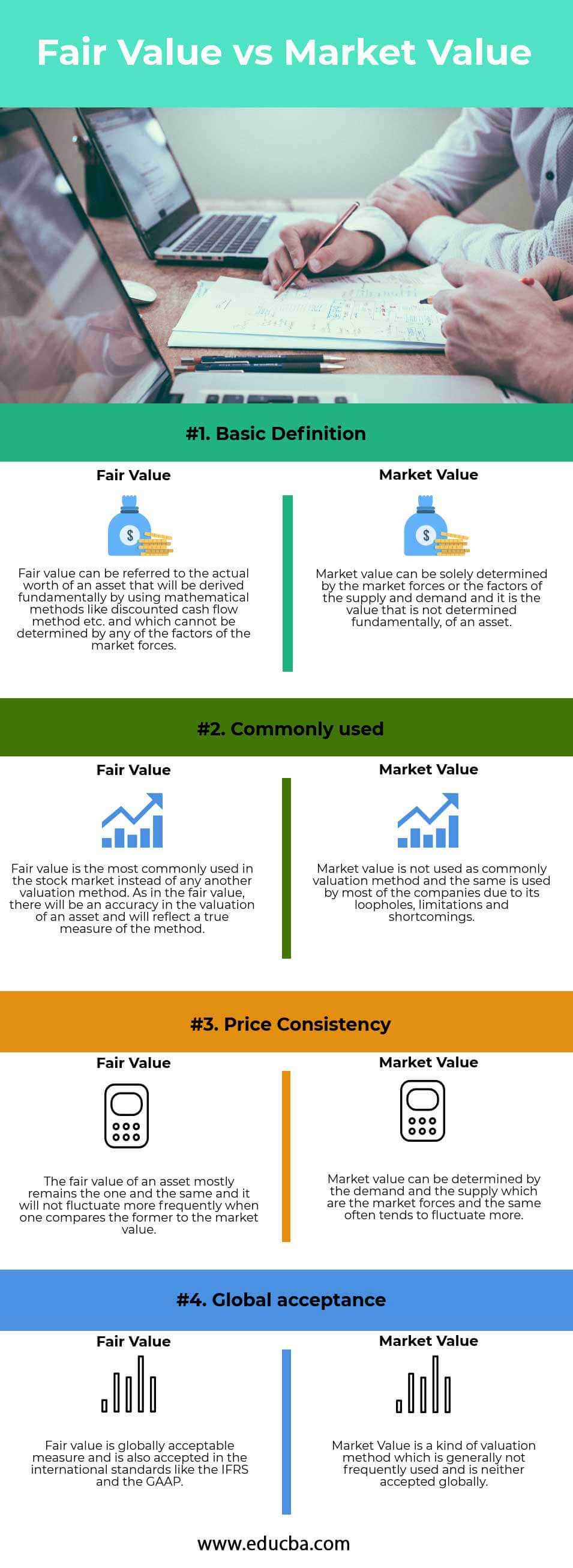Difference Between Fair Value vs Market Value
Fair value is the most commonly used phrase when it comes to conducting a valuation of an asset. Fair value can be termed as that value by which an asset is exchanged hands between 2 parties. This can be more likely traced to a stock’s fair value or share price. In other words, an asset’s fair value is the amount paid in a transaction between parties involved if it is sold in the open market. A willing seller and buyer should have agreed upon this value. On the other hand, the market value of an asset or any other thing can be termed as the value in which the market is made for an asset.
Market value is the company’s value, calculated from its current or stock price. The same would rarely reflect the actual current value of a company because the market value will reflect demand and supply in the investing market and how eager (or not) the investors are to participate in the company’s future.
Head To Head Comparison Between Fair Value vs Market Value (Infographics)
Below is the top 4 difference between Fair Value vs Market Value
Key Differences Between Fair Value vs Market Value
Both Fair Value vs Market Value are popular choices in the market; let us discuss some of the major Differences
- The key and the major difference between Fair Value vs Market Value is that market value is not an appropriate method for judging the truth or the intrinsic value of an asset it’s because the market value will be highly dependent on the market forces of the supply and the demand which is again very fluctuating and is also very dynamic in nature. On the contrary, fair value will not be dependent upon the market forces of any supply and demand and will be purely dependent on the true or intrinsic value of the asset.
- Another major and key difference between Fair Value vs Market Value is that the fair value of an asset will always be adjusted for an impairment (when the value goes down) which is due on the asset. An asset’s intrinsic or true value can be derived using the same method, while the market value is determined or arrived at by the two parties involved in the transaction. When they meet and post their negotiation, they will arrive at a final price or the deal price, which will not always be logically driven, and they are, in most cases, irrational in nature.
- In most cases, the model of fair value is often the fundamental valuation of an asset of the company, etc. model. The fair value, which represents the fundamental value of an asset and what it should be worth, is distinct from the market value, which is determined by market forces and not derived through fundamental methods.
Fair Value vs Market Value Comparison Table
Below is the topmost comparison
| The Basis Of Comparisons |
Fair Value |
Market Value |
| Basic Definition | Fair value can be referred to as the actual worth of an asset that will be derived fundamentally by using mathematical methods like discounted cash flow method etc., and which cannot be determined by any of the factors of the market forces. | An asset itself does not fundamentally determine market value but by market forces and supply and demand factors. |
| Commonly used | In the stock market, fair value is the most commonly used valuation method instead of any other. As in the fair value, there will be accuracy in the valuation of an asset and will reflect a true measure of the method. | Most companies do not commonly use market value as a valuation method due to its loopholes, limitations, and shortcomings. |
| Price Consistency | An asset’s fair value remains mostly one and the same, and it will not fluctuate more frequently when one compares the former to the market value. | The demand can determine market value, and the supply, which is the market force, often fluctuates more. |
| Global Acceptance | International standards such as the IFRS and the GAAP recognize and accept fair value as a globally accepted measure. | The global acceptance and usage of market value as a valuation method are generally limited. |
Conclusion
Understanding the key differences between Fair Value vs Market Value is very important, especially in the valuation industry, mostly the brokerage firms or the investment banking industry.
A valuation firm may also be an investment bank, and it will try to perform a valuation of an asset through several methods. They will then decide which value closely fits the asset to sell it at a price that justifies and accurately represents its value. Often for some assets, without an open market that can help determine an asset’s fair or intrinsic value becomes costly and difficult.
However, besides that, there are minor shortcomings in the fair valuation or intrinsic valuation methodology, which supersedes the other valuation methodology, and the same will usually be considered one of the best practices in the industry.
Recommended Articles
This has been a guide to the top difference between Fair Value vs Market Value. Here we also discuss the Fair Value vs Market Value key differences with infographics and comparison table. You may also have a look at the following articles to learn more.





